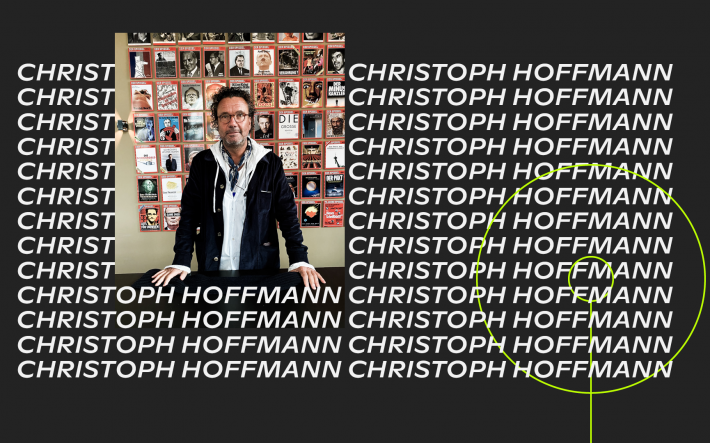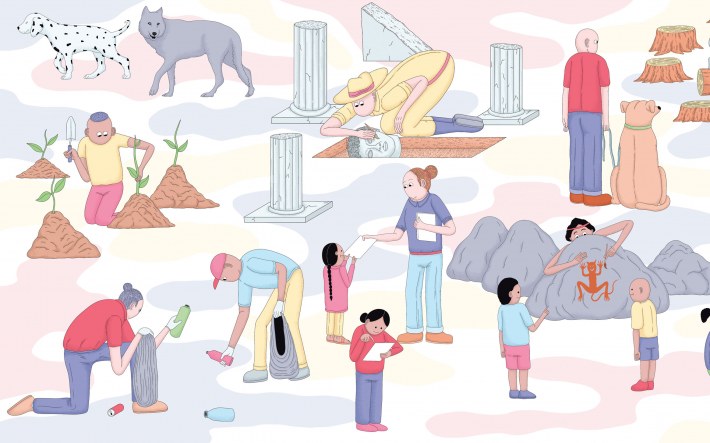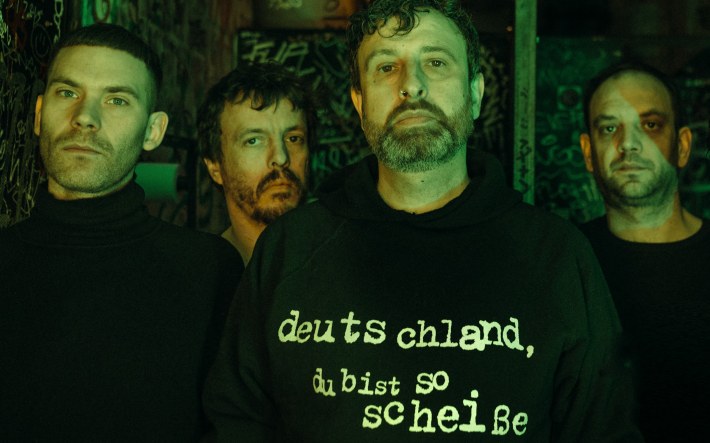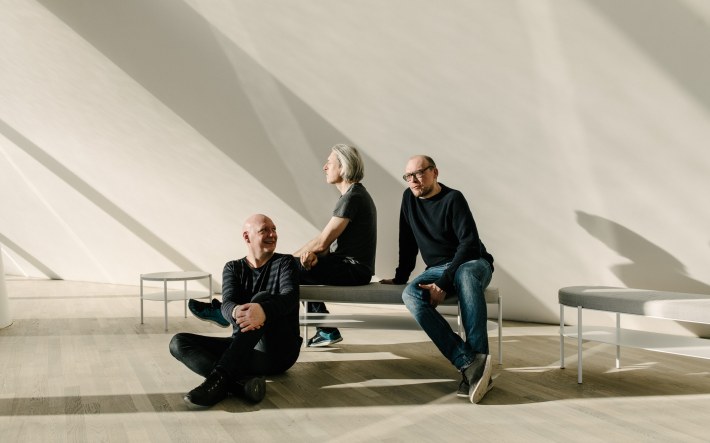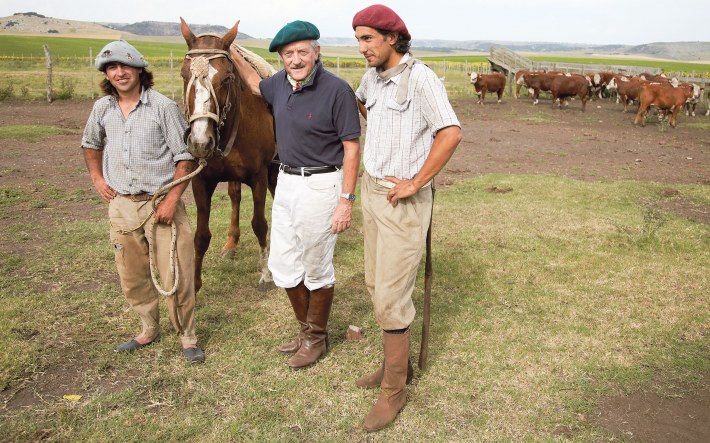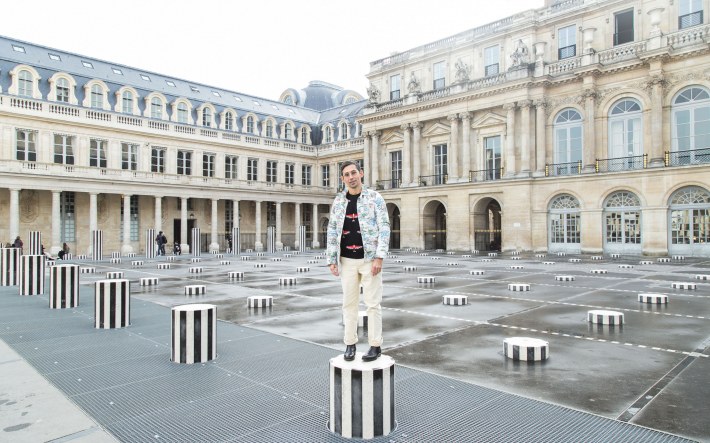Bordeaux on Board
A slightly lesser-known side to the town Bordeaux is its vibrant street culture — a facet that comes to life when experienced through the world of underground skateboarding.
COMPANION met one of the trailblazers of the local scene, Leo Valls, who introduces us to his city from the unique vantage point of his board.
The walls of the alley give way to a broad square of polished brick, lined with trees and pleasant façades. A group of skaters fans out and circles the square with a fluid, sinuous ease, boards sliding over walls, grooves, and notches. A man — slender, in a loose T-shirt and jeans — issues from the group and sails down the edge of a granite staircase. He looks back with a smile and grinds to a halt with an air of palpable content. It’s French pro skater Leo Valls, a well-known figure in the world of underground skateboarding, and a local icon in Bordeaux. He and his international team at Magenta Skateboards celebrate skating in its purest form, as a mode of creative self-expression — an art that is free and impulsive. They’re shifting the industry’s traditional focus away from skate parks and half pipes to promote a form of skating that is spontaneous — improvising and reacting to the urban milieu.
‘Skateboarding has been formatted to portray a certain ideal. For most people, it’s easier to understand and follow skateboarding when it’s something very technical, or something very dangerous or trendy,’ Leo says when he stops for a breather, explaining his rejection of the notion of skateboarding as simply a mainstream competitive sport. To him, underground skateboarding means ‘not caring about rules created by the industry, doing what you feel like, and building a network around it.’
This network of skaters and friends began in Bordeaux: an alternative port city in southwestern France with a temperate climate and small-town vibe that still draws young crowds, and a creative pressure valve for the more renowned and populous Paris. ‘I love to just go skate without a camera or a project in mind, being out with friends and enjoying the city. Moving with the day,’ Leo says. There’s a strong skating culture here, which is regularly celebrated. What he likes about underground skating is how accessible it is to a wide range of people: ‘I see people every day using skateboards as a way of moving in the city. It’s more economical and ecological than driving a car. It’s more fun, too — you’re outside breathing, being physical.’
Leo’s love of skating with friends, searching out new spots, and inventing styles has taken him beyond Bordeaux and on to a series of sponsorships and worldwide adventures. He’s toured the US, Australia, Europe, and Asia, and has been flying to Japan every year for nearly a decade. ‘I like to travel to places where I can meet like-minded people I can exchange ideas with and learn from,’ he reflects. Each place has its own unique skate culture, icons, and history; its own take on the power and expressiveness of skateboarding. According to him, these cultures — often at odds with the steady norms of mainstream skating, should be preserved and celebrated.
‘I’m keen on skateboarding becoming more popular and open to more people as long as it stays fun and healthy,’ Leo explains. So when an old skater and Bordeaux school director built a skate ramp in a local school yard, Leo got in touch to organise skateboarding lessons for the kids. He picks up a group of four to seven children from school to take them skating in the streets. Cruising around the city, he introduces them to the elements and etiquette of street skating: ‘Interacting with people, and getting kicked out of spots by grandmas,’ he says, laughing. His advice to them? To be polite to everybody, to eat fruit for energy, and to stay hydrated.
Hanging out with a pro skater and learning tricks is something many kids — and adults — dream of. ‘The kids love it,’ Leo says. ‘They get too excited sometimes and I have to calm them down a little bit, but it’s very fun. What’s cool is that by developing their passion, they’re open to discovering other new things within the culture of skateboarding. There are a lot of mediums they can gravitate to, such as photography, video production, art, design, architecture … I see the potential in them.’
The creativity that skateboarding fosters is exemplified by Leo’s main sponsor: Magenta Skateboards. Alongside selling original boards and equipment, they produce content that pushes the messages of underground skateboarding. They even designed a shoe in collaboration with Adidas. ‘It’s a big crew of homies. Everyone who works for the company is passionate about skating. It’s a constant creative project, always working on videos, photos, and editorial content. It seems like all skateboarders are doing something else around skating. I have a lot of skater friends who became very good at filming, shooting, drawing, designing through projects like these,’ Leo explains. ‘Skateboarding-wise, the main idea behind the brand is to show a way of enjoying the city life, exploring, travelling … It’s quite simple: no competitions, no trying to win anything, just doing your own thing.’
As Leo skates from the square down quiet, shaded lanes, the pleasant grumble and click-clack of skateboards on concrete is amplified by rows of staid stone apartments, their roofs warming in the afternoon sun. Bordeaux is a picturesque town, and its neat ensemble of stairs, rails, benches, courtyards, and smooth marble passageways are the perfect setting for casual, carefree skating. But as more skaters move to Bordeaux to experience this organic skating tableau, the city’s relationship with skateboarding has vacillated.
‘The authorities don’t like it for sure. If you see the cops, you have to bounce. A lot of people only see the bad parts of it, it’s loud and can cause damage to architecture, but you also see a lot of people who love it because they see expression,’ Leo explains. ‘What’s funny is that the city tries to use skateboarding as a promotional tool, to show that they’re a young city, that they like the youth, that they promote outdoor activities. They have ads showing skateboarding, for example, and they also did some big events at the city hall that portrayed skateboarding as creative, which is great, but at the same time, the police give us tickets. It’s a little ironic,’ he grins, before pushing off to find the next spot.
Later that day, at Dune du Pilat, Europe’s biggest sand dune, just 37 miles from Bordeaux, Leo reflects on his position and daily routine over a meal with friends as the sun’s dying hues refract on the horizon. His life is an example of pro skater success — of tours, films, and merchandise — but one that strikes a balance between professional obligations and personal expression. ‘Even though money is not the priority, you need to make a living eventually. So pros need to find a balance between being creative and expressing themselves while still making a living through skateboarding,’ he says.
Leo’s days usually involve creating content for Magenta — writing or editing video — having lunch with his wife, Lauren, and planning tours, before doing what he does best: skating the streets, where he encounters friends and gathers creative inspiration late into the night. ‘With the Bordeaux lifestyle, sometimes we get back home at 3:00 or 4:00 a.m.’ Leo says, pausing. ‘When you’re out in the streets all day, you see what’s going on. You see rich people, you see poor people, you see it all. It makes you think a lot — it’s a catalyst for everything.’




